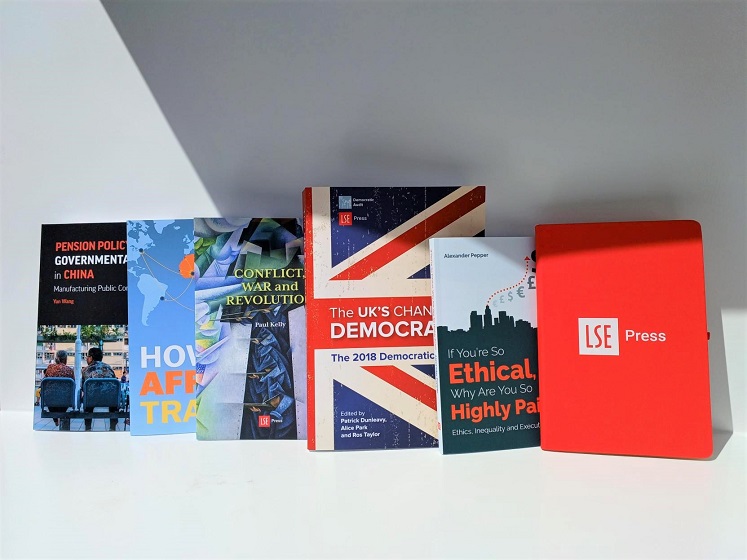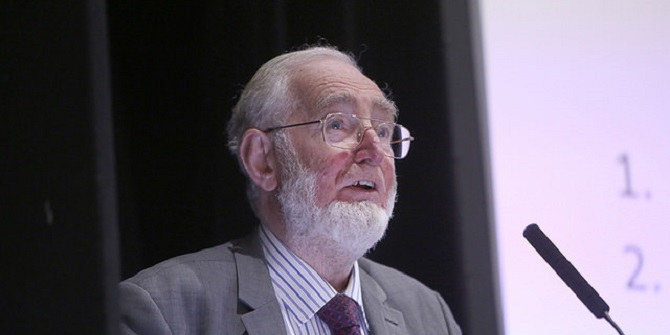On the occasion of LSE Press‘s five-year anniversary as an open access publisher, the LSE Review of Books blog spoke to Editor-in-Chief, Patrick Dunleavy, and Chair of the Editorial Board, Sarah Worthington, about the press’s achievements to date and plans for the future.
Q: Why was LSE Press founded and what is its mission?
Patrick Dunleavy (PD): LSE was for many decades a college of the wider University of London. The School has never had a university press, and so all our academic books had to go to external publishers. Numerous successful journals were founded in individual units of the School (such as Modern Law Review, Economica and the British Journal of Sociology) and continue today, but otherwise we also had no corporate capacity for publishing journals.
From 2010, the developing and now runaway success of seven major School academic blogs (such as British Politics and Policy, Europp, USAPP, LSE Business Review, LSE Review of Books and LSE Impact blog), all initially established by my LSE Public Policy Group and now run by LSE Communications Division, and several academic blogs more recently established, grew the importance of publicising LSE’s academic work (alongside other evidence-based social science work) in open access forms via social media.
This short-form publishing success (accounting for 40 per cent of all LSE website traffic in 2022) prompted the previous Librarian, Nicola Scally, to launch long-form publishing via LSE Press in 2018. It became very important for LSE to redirect some of its resources to enhance global open access to excellent social science work from LSE and other universities.
Q: Why is open access publishing a cornerstone of its approach to academic publishing?
PD: LSE Press is essentially a digital open access publisher of books and journals, committed to making available all our book and journal outputs completely free to anyone across the globe who has access to an internet-enabled device.
Many academics and students in the world’s less advantaged universities are denied access to paywall publications, as of course are many working in business, government and public services, independent students and researchers without library access, and ordinary citizens. It is a key part of LSE’s new global mission to help grow the capacity of the global social sciences and (along with the blogs) LSE Press will become an ever more important part of that mission. We also sell paperback versions of all our books, but again at the lowest feasible cost.
Around 75 per cent of journal articles worldwide are now open access, and so can be widely read. However, the authors or their universities have had to pay costly Author Public Charges (APCs) for this “gold OA” – typically running at £1500 to £2500 per paper. Such high costs discriminate against more disadvantaged and well-funded members of the world’s academic community outside the top global institutions. Our commitment is to boosting low-cost open access publishing of high-quality social science journals on a merit-only basis. Accordingly, APCs on all our journals are under £500, and we are committed to no author with great work being denied publication for lack of finance.
On books we welcome any co-funding from departments and universities if available, but we are committed to publishing open access, purely on academic merit. We appraise all books without references to funding, using rigorous closed review processes, overseen by our lead academic Editorial Board, drawn from across LSE’s departments, and its Chair.
Q: What have been some of the greatest challenges for a new academic press starting out? What are some of the advantages?
PD: As with the academic blogs, academic communities can be somewhat risk-averse towards academic innovation, and many people need to see something new up and running before they can appreciate it. In addition, any new academic press faces a big “start-up dilemma” with authors – who legitimately ask, “Why should I trust my book or journal article, which has cost me years of labour to produce, to a new operation?”
For books especially we look to publish the best academic social science work – and so we are competing with established university presses, like Oxford, Cambridge, Harvard or Princeton. Our editorial standards, production quality, dissemination capabilities and public reputation have had to be comparable to theirs from Day 1 – not an easy task to accomplish fresh out of the blocks.
We have been able to overcome this barrier by recruiting some brilliant and committed authors from LSE and beyond who are committed to open access publishing, and then by getting our first 20 books out at a great standard and demonstrating the enormous reach possible with digital open access publishing. We have worked very intensively with authors on our early books to fully develop the potential of their work, and to create the largest feasible readership for them, whether their books are textbooks, academic research monographs, impact books or shorter contributions to debate – and across a wide range of social sciences and humanities. We are enormously grateful to all our authors for their unstinting help and deep attachment to the highest academic values (including OA).
Q: What achievements are you and the rest of the LSE Press team most proud of at this five-year mark?
PD: In the last three years in particular, the LSE Press team has performed extraordinary feats, successfully developing our three early journals,”flipping” the journal Economia from closed access under Brookings Press to open access with us (including its entire back catalogue) and starting the new Philosophy of Physics journal – their brilliant first issue is out in the next two weeks.
But I guess we are most proud of the range and quality of our first 20 books (some still in press) and their huge success in reaching audiences worldwide. Two early books, Advanced Macro-economics and The UK’s Changing Democracy have both now passed 35,000 downloads each, and we are confident that even such demanding academic books as Paul Kelly’s (sadly all-too-topical) epic Conflict, War and Revolution will achieve 10,000 downloads. Other recent books, like How Africa Trades and Spectrum Auctions, have accumulated huge readerships already and had major public policy impacts. Our books have showcased excellent social science research from many institutions, and have covered the UK, Europe, Africa, South-east Asia, China, Latin America and the USA. The discipline range includes economics, applied economics, political science, philosophy and political thought, public policy and administration, international relations, sociology, geography, media studies, area studies and contemporary history. All our team members have contributed over and beyond expectations, and I am enormously grateful to every one of them for their wisdom, expertise, guidance and commitment.

Q: As the newly appointed Chair of LSE Press, what values and objectives are you keen for LSE Press to prioritise going forward?
Sarah Worthington (SW): I don’t think I’ve ever been quite so excited by a new role as I am by this one. Patrick Dunleavy has done a fabulous job in proving the concept of an LSE Press and showing it works as a viable start-up. My job is to build on that, and – with others – to work to give the LSE Press its defining personality and ensure its growth is sustainable.
The values side is easy. This is the LSE Press, so it must be infused with LSE’s values and principles. When LSE Press was launched in 2018, its aim was to become one of the leading open access publishers for the social sciences. But to get there we need a plan, and you ask me what my immediate priorities are.
As I see it, the most important task is to refine the LSE Press vision and clarify its focus. It can’t be all things to all people. We need to develop a focused commissioning strategy which will drive not only commissioning work, but also editorial decisions and philanthropic requests.
The second objective is to get LSE Press funding onto a sustainable footing. This won’t happen overnight. Open access is obviously free to the reader, but it is not free – it takes time and effort and money to turn a manuscript (even a free manuscript) into a good book, and then make that book accessible on some suitable user-friendly OA digital platform. If LSE Press is to grow, its resources need to grow.
Finally, but crucially, I want to help build the Press team, and become a part of it myself. The present LSE Press team is tiny but simply wonderful: I know we’re going to have fun together. I’ve only met the Editorial Board online, but they seem skilled and enthusiastic, so I hope they are up for an increasingly significant role in these next steps. There’s a lot to do, but I’m optimistic. I’m probably eternally optimistic, but I really think we can do this, and do it well.
Q: LSE Press publishes a dynamic range of books across the social sciences, by authors and within and beyond the institution. What is the editorial board looking for in a book proposal?
SW: LSE Press is intent on publishing across the full range of the social sciences, including interdisciplinary and cross-jurisdictional collaborations. We want authors from around the world to publish with us, and will work with any who are struggling with Book Processing Charge paywall barriers. And we want to ensure we have a reputation for publishing work that is likely to have real impact and influence across the widest possible audiences.
Some of these books will exemplify the social sciences in action; some will explain and evaluate social science principles and methodologies; some will look backwards, exposing the trajectories of ideas that changed the world; some will look forwards, setting agendas for the future. There is no set model, but the value of OA is its ability to reach large numbers of readers and change their perceptions. So we seek books that have this potential.
But LSE Press is also a quality gatekeeper. We aim to publish only the very best social science research, and – in true LSE style – to focus on research that educates, informs and contributes to collaborations and innovations for the benefit of societies around the world. In pursuit of that last goal, we want to ensure that research is presented to readers in the most accessible, robust and compelling way possible, on user-friendly digital publishing platforms. That said, all our books are also available as rather beautiful print-on-demand books – I love them!
Q: Are there any emerging trends in social science research or changes in how research is shared and consumed that are impacting academic publishing?
SW: There are lots of changes in publishing already on our doorstep, some good, some downright bad, depending on how the tools are used – take OA and generative AI as easy examples. Research agendas and methodologies are changing too, with interdisciplinary work, international collaborations and open data only increasing the speed of change and faster delivery of new insights.
OA is the new mantra in publishing, and it certainly makes publication faster and reader access easier. But we live in an information deluge, and one of the roles of the LSE Press is to mine the research terrain for the real gems, so that readers can be confident that what is presented to them is based on rigorous research and robust analysis, and that counterarguments are fully acknowledged, even if only to be dismissed.
Q: What’s next for LSE Press (such as forthcoming titles)?
SW: You can view our forthcoming titles on our website, including Michael Cox’s Ukraine: Russia’s War and the Future of the Global Order (December 2023) and Naila Kabeer’s Renegotiating patriarchy: Gender and the Bangladesh paradox (2024). Beyond that, watch this space! I’d love to come back with news of our next major steps at LSE Press, especially in this exciting growth phase, so perhaps I should stop here and hope you’ll want more later on.
Note: This interview gives the views of the author, and not the position of the LSE Review of Books blog, or of the London School of Economics and Political Science. The interview was conducted by Anna D’Alton, Managing Editor of LSE Review of Books.
Image Credits: LSE Press.
Visit LSE Press
This post originally appeared on the LSE Review of Books





